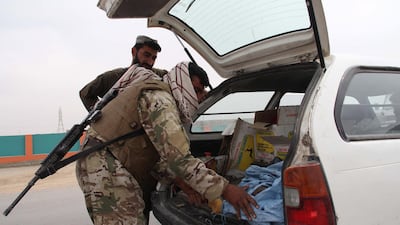Veterans and policy hands involved in the two-decade, American-led Nato mission in Afghanistan are still digesting President Joe Biden's decision to end the longest-running war in US history.
But they are concerned that without a political settlement, the military withdrawal will result in only further chaos across the region.
Another 7,000 Nato troops will leave Afghanistan alongside about 3,500 US troops by September 11 under Mr Biden's deadline.
Canadian Maj Gen David Fraser, who led the Nato mission in Afghanistan's south in 2006, told The National that Mr Biden's withdrawal did not surprise him.
But he said it could leave a vacuum that terrorist groups could exploit, as well as regional powers China and Russia.
“Three presidents have been trying to get out: Obama, Trump, Biden,” Maj Gen Fraser said.
“Biden has said he is committed to the diplomatic process and still committed to fight terrorism whenever terrorism raises its head.
"Time will tell whether either one of those things they actually do.”
He described the situation in Afghanistan as a period of great flux.
There is "great concern about what is going to happen to the future of Afghanistan", Maj Gen Fraser said.
"The Taliban’s intent is well understood. They want to overthrow the Afghan government and bring it back to pre-2001.
"The Afghan government has been asleep at the switch because they haven’t really been pushing for a peaceful reconciliation with the moderate side of the Taliban.”
He said Mr Biden “is trying to force the hand of the Afghan government”, but doing so carries “a huge political risk".
“Whether or not they can do it, I’m not sure. I’m probably more sceptical than I am optimistic,” Maj Gen Fraser said.
Stephen Biddle, a Columbia University professor who served on Gen Stanley McChrystal’s Initial Strategic Assessment Team in Kabul in 2009, called the withdrawal “a mistake".
"I think the administration's stated rationale doesn't make a lot of sense," Mr Biddle told The National. "Outright defeat and failure is most likely.
“The administration said that it’s still interested in a negotiated settlement, which I think is the better course.
"But we only have two sources of meaningful leverage in those talks: a promise of aid and the US troop presence.
“We just gave away one of only two important sources of leverage in exchange for nothing.
"There were no concessions from the Taliban side. This is not an exchange for a settlement that ends the war.”

Mr Biden’s September 11 withdrawal date misses the May 1 deadline the US agreed to in last year’s deal with the Taliban under the Trump administration by only a few months.
Thousands of American troops have already left Afghanistan since the deal was signed in February 2020.
But the Taliban have already used the slight delay in the full US withdrawal deadline as an excuse not to attend peace talks that Turkey intends to convene this month.
The congressionally mandated Afghanistan study group report released in February advised against US withdrawal until the Taliban met the conditions in last year's agreement, reduced violence against Afghan people and formed a comprehensive political settlement with Kabul.
US Secretary of State Antony Blinken's surprise visit to Afghanistan on Thursday to meet President Ashraf Ghani was no doubt intended to reinforce US support for the government.
He also met Mr Ghani's rival, Dr Abdullah Abdullah, who was appointed to oversee peace talks for the Afghan government.
It remains unclear whether Mr Biden's withdrawal will threaten the cohesion of the US-backed government and Afghan forces, which could further add to the chaos and conflict plaguing the country.
“It’s also likely to reduce the willingness to co-operate among a host of Afghan warlords and power brokers who are likely to see the case for self-sacrifice and a larger good that’s going to produce a better Afghanistan as a losing prospect right now,” Mr Biddle said.
“I think it’s going to be every person for themselves.”
If the political process fails – both with the Taliban and among its opponents – the prospect of increased violence continues to loom over the long-suffering Afghan people.
Andrea Prasow, Human Rights Watch's deputy Washington director, told The National that "no party" in the Afghanistan war has "adequately protected civilians", including the US.
“The Taliban, in the areas they currently govern, have a very mixed record with respect to human rights,” Ms Prasow said.
“The Afghan government also has a mixed record with respect to human rights.
“We are concerned about backsliding the gains that the Afghan people have sustained in the last 20 years.”
She called on the US and other governments to “increase where possible their support for human rights in Afghanistan, in particular for women’s rights and the rights of girls".
“We would love to see them boosting the funding for education and health, for independent media, for civil society, really see them support human rights defenders in Afghanistan,” Ms Prasow said.
The Biden administration's deputy envoy for Afghanistan, Molly Phee, is set to brief the Senate on the military withdrawal, behind closed doors on Monday.
Ms Phee will have her work cut out for her as she fields questions from a bipartisan group of senators who feel the administration has yet to provide them with a clear grasp of policy implications of the withdrawal.








